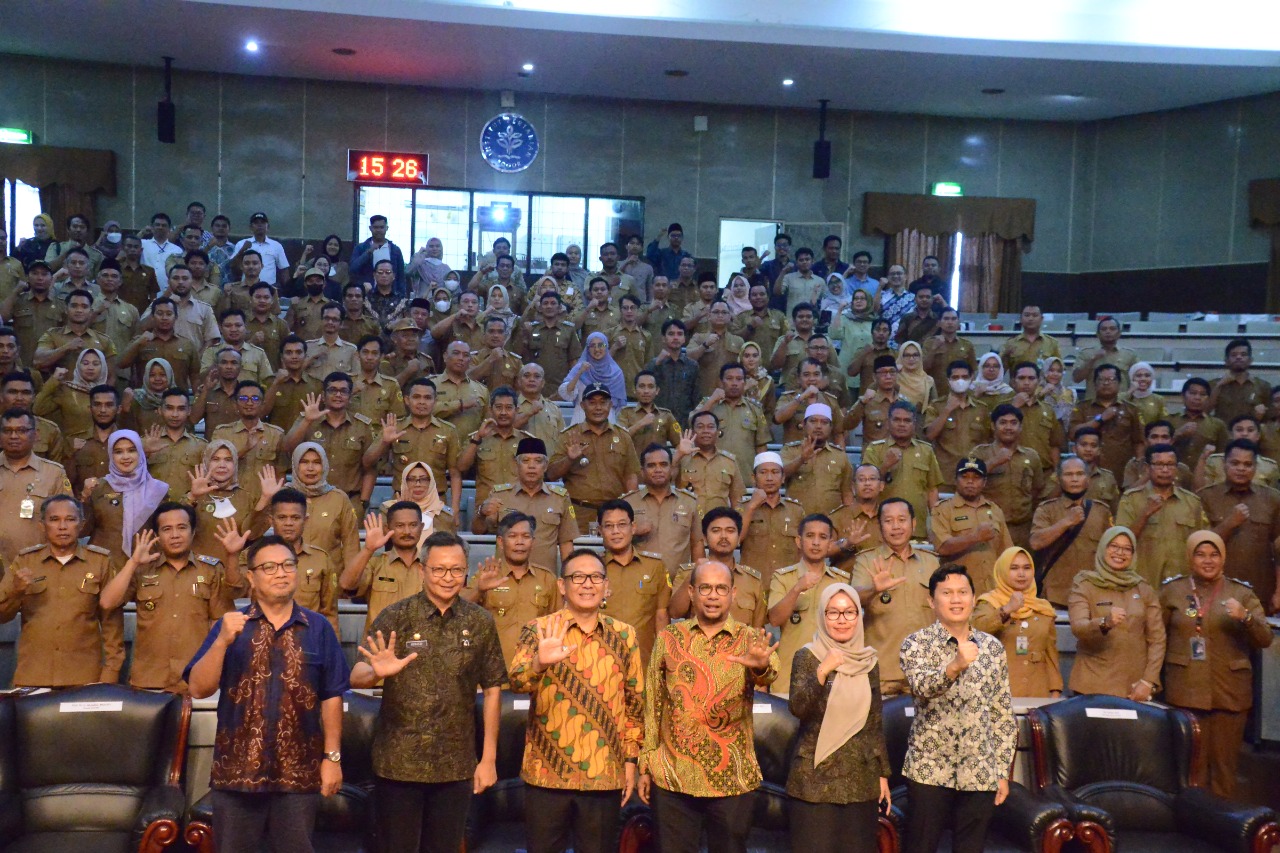SMA Kebangsaan Kunjungi IPB University, Lakukan Curriculum Alignment K2020
Toto Priyana, Ketua II Lembaga Perguruan Taman Taruna Kebangsaan dan 5 guru SMA Kebangsaan melakukan kunjungan ke Direktorat Pengembangan Program ...

“SDG 16 and 17 explore some of the underlying factors that are needed in order to ensure delivery of the other SDGs. Peace and Justice go hand in hand – and indeed are vital for equity between people and countries. Supporting this we need our institutions to be strong enough to maintain a focus on delivering the SDGs. This can range from individual justice – eradicating modern slavery and people trafficking – to ensuring that our countries have the evidence base needed to react appropriately to crises.”
(THE Impact Rankings)
IPB university has elective representation (the Board of Trustees), namely Majelis Wali Amanat (MWA), the highest body at the University. According to the MWA Decree of IPB University no. 09/WMA-IPB/P/2021 concerning organizational structure and governance, MWA has 17 members consisting of representatives of various stakeholders, including The Ministry of Education, the Rector, the Academic Senate representing faculty members (8 people), the chief of staff organization, the president of the student organization, the chief of the alumni association, and representation of society (4 people).
IPB University has 107 student organizations as a forum for students in democratic learning related to the academic environment, student affairs, etc. Each faculty, department, and the university has a students’ union consisting of the Student Consultative Assembly (MPM), the Student Representative Council (DPM), the Student Executive Board (BEM), the Undergraduate Students’ Professional Association, the Vocational Professional Association, Student Activity Units (UKM), and Postgraduate Student Community (Forum Wacana). Students’ union is regulated in the Rector’s Regulation No.19/IT3/KM/2018.
Rector Decree No. 17 of 2021 concerning the head of intra-campus student organization
IPB University formulated policies and procedures to identify stakeholders and aims to build strong engagement with them, as written in IPB Statute Article 38-39, which specify collaboration in academics and non-academic affairs (pages 19-20, Article 38-39). In more detail, this collaboration is regulated through MWA Regulation No. 11/IT3.MWA/PR/2018 concerning Non-Academic Collaboration (Kerjasama Non-Akademik). Article 4 specifies the scope of non-academic collaboration that can be implemented by IPB University. Article 7 point 2 specifies the criteria of partner candidates that have to be assessed. Article 8 specifies the procedure for implementing collaboration.
IPB University ensures that local stakeholders in the university, including residents, local government, and civil society representatives, have a meaningful mechanism for university decision-making. The engagement of stakeholders is manifested in the structure of the Board of the Trustees IPB University, such as Lecturer Representatives, Community Representatives, and Student Representatives.
Local stakeholders, including local government and civil society, are important elements of the Board of Trustees of IPB University, who participate in the university’s decision-making. There are four representatives of society who take part in the Board of Trustees of IPB University, including:
IPB has a management unit for Community Services under the Institute of Research and Community Empowerment of IPB (LPPM).
IPB also actively engages with the local government in Bogor. For example, in 2021, IPB University and the Local Government of Bogor launched Sekolah Pemerintahan Desa to implement good governance.

IPB has a policy on organized crime as stated in Senate Academic Regulations No. 33/SA-IPB/P/2019, article 1 point m, page 3, and article 11, page 9-10 “Pencegahan Kejahatan Luar Biasa”. To build integrity, one of the university values, IPB University spreads the spirit of anti-corruption among the academic community. One of the programs is Anti-Corruption Education for Students, implemented in 2021.
IPB has the policy to support academic freedom through Academic Senate Regulation No. 28/SA-IPB/P/2018 concerning Norms, Academic Freedom, and Scientific Otonomy. Article 4 point 2 specifies the scope of academic freedom, including teaching, research, and community empowerment. This regulation is valid for all faculty members, regardless of their ages, as well as staff and students. Article 4 point 3 specifies various areas or forums in which academic freedom is ensured and respected.
IPB University committed to publishing its financial report annually. The annual financial report is publicly opened and audited by Independent Auditor, namely PWC. The opinion of the public accountant on the IPB Financial Report 2021 can be seen on Page 4. It is written that the consolidated financial performance and cash flow in 2021 are under the Indonesian Financial Accounting Standards
IPB University actively provides advice and inputs for policy-making made by the local, regional, and national governments in agriculture, marine, and biosciences. The followings are several pieces of expert advice delivered to the local, regional and national governments in 2021.
IPB University maintains activities for providing general education, upskilling, and capacity-building for policymakers at various levels in agriculture, marine, and biosciences:
IPB University undertakes policy-focused research in collaboration with government departments. Some of these activities include collaboration with the local government and national government, such as:
IPB Strategic Talks is a neutral platform and safe space for political stakeholders to discuss challenges. Various topics on policies related to agriculture, marine, and biosciences have been discussed among various stakeholders, including academicians, government, and political stakeholders. IPB Strategic Talks is organized regularly by the Directorate of Scientific Publications and Strategic Information.
7,985
Number of graduates in most recent year
273
Number of graduates from Law
3.42
Percentage of graduates from Law
Toto Priyana, Ketua II Lembaga Perguruan Taman Taruna Kebangsaan dan 5 guru SMA Kebangsaan melakukan kunjungan ke Direktorat Pengembangan Program ...
Dr Wisnu Ananta Kusuma, Peneliti Pusat Studi Biofarmaka Tropika (Trop BRC) IPB University menjelaskan bahwa pengobatan presisi akan memudahkan diagnosa ...
Sekolah Pascasarjana (SPs) IPB University menerima kunjungan dari Pascasarjana Universitas Pattimura (Unpatti) di Kampus IPB Dramaga Bogor (30/1). Kunjungan Pascasarjana ...